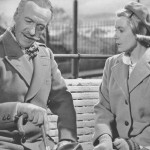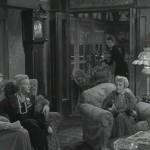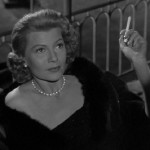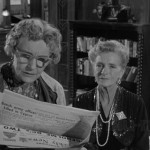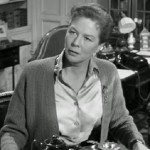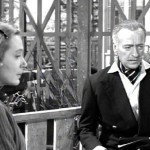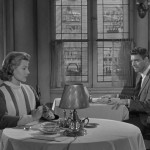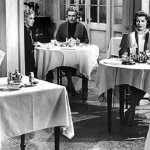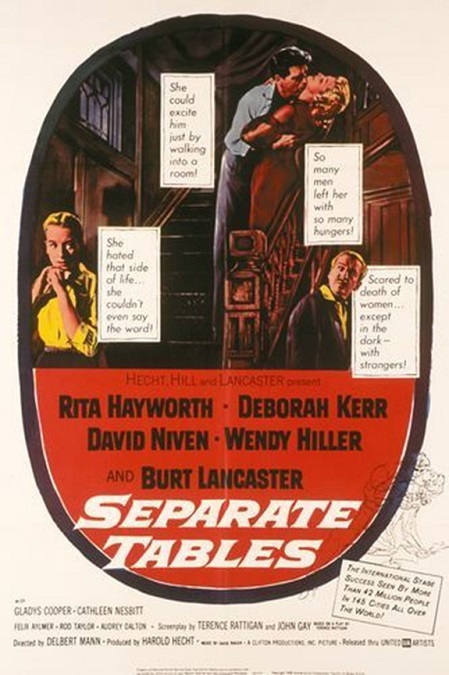
Separate Tables – 1958
There wasn’t much to this film. It had a few big names, and a few mildly interesting scenes, but not much else. To put it more plainly, it was a bit boring. It was an American film disguised as a British film, and as such, it seemed that much of its drama relied on subtlety and subtext. There is nothing wrong with that, but it translated as conflicts that are not very intense and characters who don’t get very emotional. In other words, the drama is there, but you really have to look for it.
The main plot dealt with issues of class and prejudice, lost souls in search of companionship, and love that cannot be denied. It sounds like a recipe for something deep and meaningful, but I felt like it was a poor man’s version of a mix between Grand Hotel and the Monty Python comedy series Fawlty Towers… except without the comedy. The whole film took place in a quiet little English boarding house. The various residents, each of whom had their own unique personality, all had their own moments of importance. I think the real interest of the film was supposed to be getting to know them all and seeing how they each reacted to the quaint happenings that took place amongst them.
There were two main stories going on at the same time, so it was difficult to nail down a main protagonist. It might have been Burt Lancaster, playing the part of John Malcolm, an American who’d once had a rocky marriage with the gorgeous Ann Shankland, a dishonest and desperate woman, played by Rita Hayworth. Unfortunately, she books a room at the hotel just as John becomes engaged to the establishment’s homely proprietress, Pat Cooper, played by Wendy Hiller.
Then again, the protagonist might be Major Pollock, played by David Niven. He is involved in a budding relationship with an extremely socially repressed girl named Sybil, played by Deborah Kerr. Sybil has lived her entire life under the strict and self-righteous thumb of her classist mother, Mrs. Railton-Bell, played by Gladys Cooper. When she finds out that the Major isn’t really a Major at all, and that he has recently been arrested for publicly molesting women in a cinema, Mrs. Railton-Bell gathers all the residents together and rallies them into forcing him from the hotel.
Each story seemed to have equal prominence, and the two sometimes overlapped, though not very often. In the end, John seemed to reconcile with Ann on some vague level, and Sybil, along with the rest of the guests, for that matter, finally defied her mother enough to convince the Major to stay at the boarding house, despite his indiscretions. But the problems never got too intense. The forbidden romance never got too steamy. Nearly everyone turned out happy in the end.
For my tastes, the drama just wasn’t dramatic enough for a Best Picture nomination. Granted, some of the acting was good. I’m used to seeing Niven as being very proper and British without being stuffy, like his portrayal of Phineas Fogg in Around the World in 80 Days. Here, he moved outside that role, being blustery and stodgy. I’m also used to seeing Kerr as being very proper and British, with confidence, like her role as Anna Leonowens in The King and I. She, too, broke out of her usual mold, and played a mousy character with severe social anxiety.
I was also impressed with Gladys Cooper. She represented intolerance and prejudice, qualities that were very unpopular in a world that was in the middle of the Vietnam War. We were quickly moving towards the 60s and their groovy ideas of total acceptance of one’s fellow man. Cooper might be called the film’s villain, from a certain perspective, and she played the part well. She was appropriately old and crotchety, and, lest we forget, completely self-righteous.
But I think it was the film’s other centerpiece that was the film’s biggest failing. The tempestuous relationship between John and Ann tried to be subtle by hinting at things that had taken place in the past while being a bit vague about things that were happening in the present. They made the point of saying “When you’re together, you slash each other to pieces. When you’re alone, you slash yourselves to pieces.” And then they leave their reconciliation a mystery, never answering the question of whether they will end up together or apart. A soft ending, I thought, for a soft plot.
